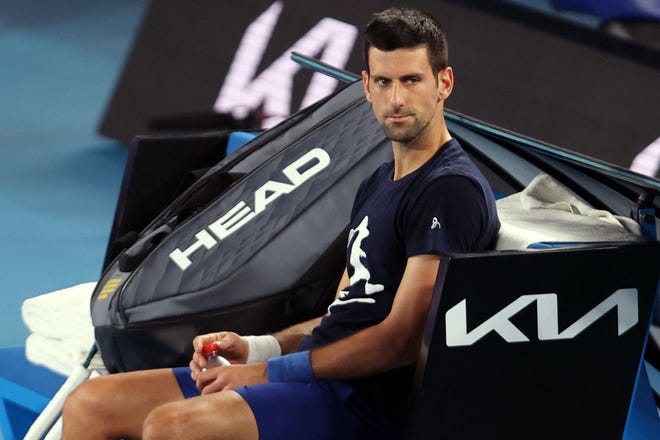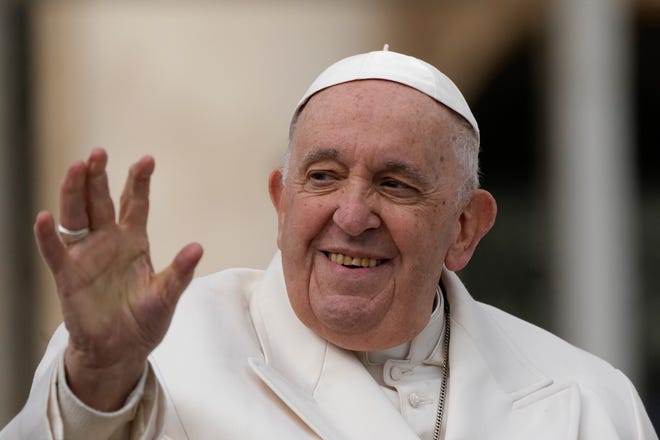
You can take a small measure of satisfaction about the proudly anti-vax tennis star getting Australia’s boot in his rear end once again while recognizing that there’s something fundamentally wrong about a government using Novak Djokovic as a political pawn.
You can acknowledge a country’s right to enforce its borders and vaccine mandates, even make policy on the fly in response to public sentiment, while admitting there’s more than a whiff of unfairness and capriciousness in the way it has handled the past week as the start of the Australian Open looms on Monday.
You can accept the premise that Djokovic poses virtually no risk to the Australian public while concluding that this mess, fundamentally, comes down to one thing: A stubborn, ill-informed man refusing to do what more than 97 percent of his peers on the pro tour and nearly every resident in the city where he wants to play tennis next week have done in getting vaccinated against COVID-19.
And so this fight seemingly has one more round left in it, with Djokovic’s visa being canceled for a second time on Friday by Australia’s immigration minister. Djokovic has already launched another legal challenge against the decision, with more drama to play out Saturday morning in Melbourne (Friday afternoon/evening in the U.S.) when he meets with immigration officials.
Perhaps the world’s No. 1 player will win in court and retain his chance of winning a record-setting 21st Grand Slam title. But at this moment, in tennis terms, he appears to be down a break in the fifth set and the government is getting ready to close him out on serve.

Technically, Djokovic’s visa is being canceled on the grounds of “health and good order,” according to Alex Hawke, the person in Australia who has governmental powers to make such a decision.
But let’s call it what it is: They don’t want him there, which was actually the easiest thing to predict in this entire story. Apparently neither Djokovic nor Tennis Australia saw it coming as they played a game of loophole limbo to get him into a country that has very little tolerance these days for either anti-vaxxers or people who don’t follow the rules.
REVOKED AGAIN: Djokovic faces deportation again after Australian government
NEVER MISS A MOMENT: Follow our sports newsletter for daily updates
Not only did Djokovic check both boxes, he did so gleefully when he posted a picture on Jan. 4 announcing he had been granted “an exemption permission” to play the Australian Open after months of speculation about whether he would play the tournament he has won a record nine times.
You could see a scenario where Djokovic never posted that picture, never had a political firestorm brewing while he was crossing continents at 35,000 feet, slipped into the country under the cover of night and continued to deflect questions about his vaccination status. It’s possible none of this would’ve happened.
But the fact Djokovic felt compelled to tell the world he had an exemption was no different than him sobbing uncontrollably in his chair in the U.S. Open final last September when Daniil Medvedev was on the verge of stopping his quest for the calendar year Grand Slam. For better or worse, Djokovic is going to show you exactly who he is at all times.
That does not suggest malicious intent, which is often how Djokovic is simplistically portrayed. The reality is harder for most people to grasp. You’d be hard-pressed to find anyone in tennis who would deny his personal kindness and generosity, his immense charitable efforts, the way he will give lower-ranked players his time and fights for better conditions for them from the ATP Tour. He answers questions from the media thoroughly and thoughtfully. And for all the focus on his on-court outbursts, which probably happen too frequently, he is probably the most gracious loser on the tour.
It’s important to say all that because this situation, too, is probably more complex than most of us really want to acknowledge.
For those of us in the U.S. that have grown weary of Kyrie Irving and Aaron Rodgers masquerading as freedom fighters because they refuse to get vaccinated, it’s incorrect to lump Djokovic into the same category.
There's a famous story about Djokovic being convinced in 2010 to go to a gluten-free diet when a Serbian nutritionist told him to hold a piece of bread against his stomach, producing a reaction of weakness in his arm. There is, of course, no scientific basis behind this test. But with the change in his diet, Djokovic went from a great player to one of the best ever, a moment that re-shaped his belief system to the point of extremity.
It even bled into 2017 and 2018 when Djokovic was in the middle of a prolonged slump, owed significantly to an elbow issue that nearly every athlete would have simply taken care of at the first opportunity. But because he had become skeptical of modern medicine, he avoided the surgery until he had no other option.
In 2018, finally recovered and back on top of the rankings, he told the London Telegraph that he cried for days and felt guilty about what he had put his body through.
“I was trying to avoid getting on that table because I am not a fan of surgeries or medications,” he said. “I am just trying to be as natural as possible, and I believe that our bodies are self-healing mechanisms.”
This is useful context to consider for how we ended up here. It does not give Djokovic a pass for the way he’s handled any of this, but it does explain why he’s gone to such great lengths to avoid the easy answer to his problems. This isn’t an act or a contrivance. He’s a true believer, even if it’s wrong and unhelpful to anyone in the middle of a pandemic.
And it has put him into a humiliating situation where an increasingly unpopular government in Australia is really on the verge of deporting one of the great champions we’ve ever seen to score political points under the guise of “rules are rules.” They are not heroes in this situation.
But neither is Djokovic, whose entire story seems so obviously bogus that he’s practically made the case for deportation himself.
If you take Djokovic at face value, his exemption to get in the country without a vaccine was based on the convenient timing of a Dec. 16 positive test for COVID-19, after which he attended multiple public events without a mask for the next couple days. Djokovic said in a written statement he didn’t know he was positive at any of those events except for a Dec. 18 interview with L’Equipe, which he said he didn’t cancel because he didn’t want to disappoint a journalist. Other aspects of the situation, like whether he went to Spain to practice around Christmas and lied about his movement on forms submitted to Australia, are bringing even more unwanted scrutiny.
If Djokovic surrounded himself with people who are less sycophantic and more honest about how he’s viewed around the world, they’d have told him not to go in the first place. Beyond the vaccine exemption from Tennis Australia and the state of Victoria turning out to be a contrivance that had little sway at the border, it was obvious that a high profile athlete coming into the country unvaccinated was going to be immensely unpopular in a place that has dealt with some of the most severe COVID-19 restrictions in the world.
From there, this has spiraled into a theater of the absurd. And for the most part, Djokovic has done this to himself.
One way or another, this has to get resolved before Monday when Djokovic is scheduled to play a first-round match against his countryman Miomir Kecmanovic. Whether he’s on the court or on a plane home by then, everyone with a hand in this disaster has already lost.
Source link






